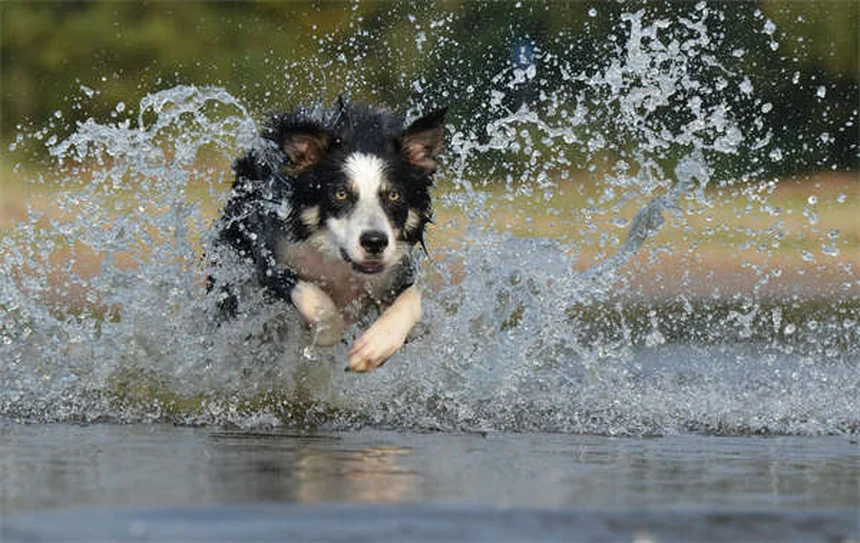Why is my dog shaking his head? The answer is: your pup is likely trying to relieve ear discomfort! Just like you'd scratch an itch, dogs shake their heads to dislodge irritants from those hard-to-reach ear canals. While occasional head shaking is normal (especially after baths), excessive shaking could signal ear infections, allergies, or even serious neurological issues.As a dog owner myself, I've learned the hard way that ignoring head shaking can lead to bigger problems. My golden retriever Max once shook his head constantly for two days before I discovered a nasty yeast infection brewing. That's why I'm sharing what veterinarians want every pet parent to know about this common behavior.In this guide, we'll break down the 7 most common reasons for head shaking, show you how to spot warning signs, and reveal simple prevention tips that could save you an expensive vet visit. Because let's face it - we all want our furry friends comfortable and our sleep uninterrupted by that 3 AM flap flap flap sound!
- 1、Why Do Dogs Shake Their Heads? Let's Dig Into This Weird Habit
- 2、The Usual Suspects: Common Causes of Excessive Head Shaking
- 3、Less Common But Serious Causes You Should Know About
- 4、Practical Prevention: Keeping Those Ears Happy
- 5、When to Call the Vet: Your Decision-Making Guide
- 6、The Hidden Language of Dog Head Shakes
- 7、Breed-Specific Considerations You Should Know
- 8、The DIY Ear Check Every Owner Should Master
- 9、Preventative Products That Actually Work
- 10、The Future of Canine Ear Care
- 11、FAQs
Why Do Dogs Shake Their Heads? Let's Dig Into This Weird Habit
It's Not Just About That Annoying 3 AM Head-Shaking Session
You know that sound - flap flap flap - at 3 AM when your dog suddenly decides his ears need a good shake. While we might find this annoying, there's actually some fascinating science behind this behavior.
Dogs shake their heads for the same reason you scratch an itch - to relieve discomfort. Their ear canals are L-shaped, making it hard to reach inside. Head shaking creates centrifugal force that can dislodge water, dirt, or irritants. Think of it as nature's version of shaking out a wet umbrella!
When Should You Actually Worry?
Occasional head shaking? Totally normal. But if your pup is doing the head-shake shuffle more than usual, it's time to pay attention. Here's a quick comparison:
| Normal Behavior | Concerning Behavior |
|---|---|
| Shaking after swimming or bath | Shaking multiple times per hour |
| Occasional scratch | Constant ear scratching |
| No visible discharge | Redness or smelly discharge |
Did you know that ear infections account for nearly 20% of vet visits? That's why catching problems early is crucial. I learned this the hard way when my golden retriever Max kept shaking his head - turned out he had a nasty yeast infection brewing.
The Usual Suspects: Common Causes of Excessive Head Shaking
 Photos provided by pixabay
Photos provided by pixabay
Ear Infections - The #1 Culprit
Imagine having an itch you can't scratch - that's what an ear infection feels like for dogs. The most common offenders are:
Yeast infections: These create a dark, waxy discharge with a distinct "corn chip" smell. My neighbor's beagle had this, and let me tell you, their couch smelled like a Fritos factory!
Bacterial infections: These often produce yellow/green pus and can be more painful. They're like the uninvited guests who overstay their welcome at a party.
Allergies - The Silent Ear Irritator
Here's something that might surprise you: food allergies in dogs often show up as ear problems first. The ear canal is basically an extension of the skin, so when allergies flare up, ears get irritated too.
Common allergy signs include:- Red, inflamed ears- Brown waxy buildup- Paw licking- Face rubbing
Pro tip: If your dog's ears act up seasonally, it might be environmental allergies. My cousin's lab gets ear issues every spring when pollen counts rise.
Less Common But Serious Causes You Should Know About
Foreign Objects - Nature's Ear Invaders
Ever gotten a popcorn kernel stuck in your teeth? Now imagine that feeling in your ear canal. Dogs get all sorts of weird stuff lodged in their ears:
- Grass seeds (these are the worst!)- Tiny sticks- Sand- Even bugs (yes, really!)
Here's a funny story: My friend's terrier once shook his head so violently that a pea-sized ball of earwax flew out and stuck to the wall. Gross, but effective!
 Photos provided by pixabay
Photos provided by pixabay
Ear Infections - The #1 Culprit
Wait - can head shaking really be neurological? Actually, yes. But how can you tell the difference between normal shaking and something more serious?
The key is that voluntary head shaking stops when the dog is distracted, while neurological tremors continue regardless. Other red flags include:- Loss of balance- Strange eye movements- Confusion
If you notice these signs, don't panic - but do call your vet. Early intervention makes all the difference with neurological conditions.
Practical Prevention: Keeping Those Ears Happy
Bath Time Strategies That Actually Work
You might be wondering: "But how do I prevent water from getting in my dog's ears during baths?" Great question! Here's what I've learned from years of bathing my water-phobic poodle:
1. Use cotton balls (just like at the dentist!)2. Never spray directly at the head3. Wipe ears with a damp cloth instead4. Try an ear-drying solution after swimming
Fun fact: Some groomers use cute little ear bands for water-loving dogs. It's like a tiny shower cap for their ears!
Regular Maintenance Beats Emergency Visits
Think of ear care like brushing your teeth - a little regular maintenance prevents big problems. Here's my simple routine:
- Weekly ear checks (look for redness or odor)- Monthly gentle cleaning with vet-approved solution- Immediate attention to excessive scratching
Remember that time I ignored my dog's ear scratching for a week? $300 vet bill later, I learned my lesson about early intervention!
When to Call the Vet: Your Decision-Making Guide
 Photos provided by pixabay
Photos provided by pixabay
Ear Infections - The #1 Culprit
If your dog's head shaking hasn't improved after a day, it's vet time. Other emergency signs include:
- Head tilting- Loss of balance- Visible pain- Bloody discharge
Pro tip: Take a video of the behavior to show your vet. Sometimes dogs act perfectly normal at the clinic (the little fakers!).
What to Expect at the Vet Visit
Worried about what the vet will do? Here's the typical process:
1. Physical exam (they'll check those ears thoroughly)2. Possible ear swab (to check for infections)3. Discussion of allergy possibilities4. Treatment plan based on findings
The good news? Most ear issues are easily treatable once identified. My vet always says: "Better an unnecessary visit than a missed problem." Words to live by!
So next time your pup does the head shake boogie, you'll know exactly what to look for - and when to take action. After all, happy ears mean a happy dog (and more uninterrupted sleep for you!).
The Hidden Language of Dog Head Shakes
More Than Just an Itch - Communicating Through Movement
Did you know your dog's head shakes might actually be trying to tell you something? Canine behaviorists have identified at least five distinct head shake patterns that correlate with different emotional states. That quick double-shake after a nap? Probably just clearing the cobwebs. But the persistent, violent shaking while making eye contact? That's your pup saying "Help me!"
I noticed this with my own dog when he developed his "I need attention" shake - two sharp shakes followed by pawing at his ear. Turns out he'd trained me to check his ears so well that he started using it as a way to get treats! The little con artist.
The Surprising Connection Between Head Shakes and Canine Emotions
Here's something fascinating - dogs often shake their heads after stressful situations, almost like a reset button. Watch your pup next time they:
- Meet a new dog- Get scolded- Experience something startling
You'll frequently see a quick head shake immediately after. Animal behaviorists call this a "displacement behavior" - it's their way of releasing tension. Kind of like when you nervously adjust your glasses during an awkward conversation!
Breed-Specific Considerations You Should Know
Why Floppy-Eared Dogs Have More Issues
Ever wonder why basset hounds and cocker spaniels seem to shake their heads more than other breeds? It's not your imagination! The anatomy of their ears creates the perfect storm for problems:
| Breed Type | Ear Shape | Risk Level |
|---|---|---|
| Floppy Ears (Spaniels, Hounds) | Long, hanging | High |
| Prick Ears (Huskies, Shepherds) | Upright, open | Medium |
| Hairless Ears (Xolos, Chinese Cresteds) | Exposed canal | Low |
The air circulation under those adorable floppy ears is terrible - it's like wearing a winter hat in summer! That warm, moist environment is paradise for bacteria and yeast. My vet friend jokes that spaniels come with built-in petri dishes.
Surprising Low-Risk Breeds
Here's a shocker - poodles and schnauzers actually have fewer ear issues despite their hairy ears. Why? Their ear hair acts like a filter, trapping dirt before it reaches the canal. It's nature's version of those fancy HEPA filters!
But don't get complacent - these breeds need regular plucking (yes, like eyebrows!) to maintain this protection. I learned this the hard way when my poodle's neglected ear hair matted into what looked like tiny dreadlocks. Not a good look.
The DIY Ear Check Every Owner Should Master
Step-by-Step Home Examination
You don't need to be a vet to spot potential ear problems early. Here's my foolproof method developed through years of trial and error (mostly error at first!):
1. The Sniff Test: Healthy ears have a mild, slightly waxy smell. If it makes you recoil, something's up.2. The Visual Check: Gently pull back the ear flap. You're looking for pale pink skin - red means irritation.3. The Touch Check: Run your finger around the outer ear. Any crustiness or bumps warrant attention.
Pro tip: Do this during cuddle time when your dog is relaxed. Trying to inspect ears during playtime is like giving a toddler a haircut - messy and ineffective!
When Home Care Isn't Enough
How can you tell when it's time to call in the professionals? Here's my rule of thumb: if home care hasn't shown improvement in 48 hours, or if your dog seems in pain, skip the Dr. Google and see the real doctor.
Remember that time I tried to treat what I thought was a simple ear infection with olive oil and garlic? Big mistake. Not only did it not help, but my kitchen smelled like an Italian restaurant for weeks. Some things are best left to the experts!
Preventative Products That Actually Work
Ear Cleaners - Not All Are Created Equal
The pet store ear care aisle can be overwhelming - how do you choose? After testing dozens of products, here's what I've learned:
- Alcohol-based cleaners: Great for drying but can sting irritated skin- Natural enzyme cleaners: Gentle but may need more frequent use- Medicated cleaners: Only use when prescribed
My current favorite is a simple saline solution with aloe - gentle enough for weekly maintenance but effective. Though my dog prefers the chicken-flavored one (yes, that exists!).
The Gadgets Worth Your Money
You wouldn't believe some of the ear-cleaning gadgets out there! After testing everything from ear scopes to automatic cleaners, here are the only two I recommend:
1. LED otoscope: Lets you actually see inside the ear canal (great for curious owners)2. Soft-tip cleaning bottles: Makes applying solution mess-free
Skip the "ear wipes on a stick" - they just push debris further in. I learned this after creating an earwax snowman on my dog's eardrum. Not my proudest pet parenting moment.
The Future of Canine Ear Care
Emerging Technologies
Would you believe there are now smartphone apps that can analyze your dog's ear health? Some even use AI to compare photos of your dog's ear to databases of common issues. While not a substitute for vet care, they're great for peace of mind between checkups.
I tried one that claimed to detect infections with 90% accuracy. It correctly identified my dog's mild irritation but also once diagnosed a "severe infection" that turned out to be spaghetti sauce. Maybe stick to the basics for now!
Holistic Approaches Gaining Traction
More vets are incorporating alternative therapies for chronic ear issues. Some promising options include:
- Acupuncture: Helps with allergy-related ear problems- Probiotics: Balances the microbiome in and around ears- Cold laser therapy: Reduces inflammation
My holistic vet swears by omega-3 supplements for dogs with seasonal ear issues. After three months of fish oil capsules, my dog's coat looked amazing - though he did develop a suspicious interest in sushi restaurants!
E.g. :Dog Shaking Head? Here's When To Worry | PetMD
FAQs
Q: How can I tell if my dog's head shaking is serious?
A: Here's how to spot trouble: normal head shaking happens occasionally (like after swimming), while problematic shaking occurs multiple times per hour. Watch for red flags like redness, smelly discharge, or constant scratching. My vet taught me the "24-hour rule" - if shaking persists beyond a day, schedule an exam. Other emergency signs include head tilting, loss of balance, or visible pain. Pro tip: Take a video of the behavior to show your vet, since dogs often act perfectly normal at the clinic!
Q: What's the most common cause of excessive head shaking in dogs?
A: Ear infections top the list, accounting for about 20% of vet visits! There are two main types: yeast infections (with dark, waxy discharge that smells like corn chips) and bacterial infections (often producing yellow/green pus). I learned this when my neighbor's beagle made their couch smell like a Fritos factory! Infections create intense itchiness that makes dogs shake violently. Always check for redness or swelling under the ear flap - but remember, some infections hide deep where you can't see them.
Q: Can allergies really make dogs shake their heads?
A: Absolutely! Here's something surprising: food allergies in dogs often show up as ear problems first. The ear canal is basically an extension of the skin, so when allergies flare up, ears get irritated too. Look for brown waxy buildup, paw licking, and face rubbing alongside head shaking. My cousin's lab gets seasonal ear issues when pollen counts rise. If you suspect allergies, your vet might recommend a special diet trial or allergy testing to identify triggers.
Q: How can I prevent water from causing ear problems after baths?
A: After bathing my water-phobic poodle for years, I've perfected these strategies: 1) Use cotton balls (like at the dentist!), 2) Never spray directly at the head, 3) Wipe ears with a damp cloth instead, and 4) Try an ear-drying solution after swimming. Some groomers use cute little ear bands - basically shower caps for dogs! Remember, moisture creates the perfect environment for infections, so keeping ears dry is crucial, especially for floppy-eared breeds.
Q: When should head shaking make me think about neurological issues?
A: Here's the key difference: voluntary head shaking stops when the dog is distracted, while neurological tremors continue regardless. Other red flags include loss of balance, strange eye movements, or confusion. My vet explained that conditions like idiopathic head tremors (common in boxers and bulldogs) require completely different treatment than typical ear issues. If you notice these signs, don't panic - but do call your vet promptly, as early intervention makes all the difference.



Discuss